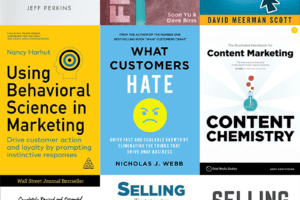Episode 29 of The Verblio Show
This episode is equal parts TedTalk and marketing masterclass with global marketing rockstar Ross Simmonds. As the founder and CEO of Foundation, Ross heads marketing initiatives for major B2B brands around the world, but he’s also an entrepreneur, investor, and true thought leader in the space.
Whether you’ve read an interview with Ross in Forbes or heard him speak at MozCon, you’re likely familiar with his energizing blend of big picture ideas and tactical insight. He shared plenty of both in his conversation with Steve, including:
- How to apply portfolio theory to your content
- The two reasons marketers suck at content promotion
- How remixing a blog post made him over $100k
- Why writing about dirt is exciting
You’ll also hear about his competitive dodgeball career, and his and Steve’s mutual obsession with obscure historical facts.
Guest-at-a-Glance
Name: Ross Simmonds
What he does: Founder and CEO of Foundation Marketing. Digital marketer, entrepreneur, investor, and globally recognized speaker and blogger.
Find Ross on the web: Foundation | LinkedIn | Twitter
Get smart: “If you fundamentally understand that every single time you press publish on a piece of content, that you’re influencing culture, then you have a better understanding of the power that you have.”
Top Tips from This Episode
Treat your content as an asset, not an expense
Too many of us view content as an expense we have to pay for on an ongoing basis that will hopefully benefit us sometime down the road. According to Ross, that’s not the best mindset.
“I think the right way to think about any piece of content that an organization creates is to view it as an asset, the same way that we would view an asset if we were to invest in stocks or bonds or real estate,” he says. “When you write a blog post, you are investing your time or you’re investing your money.”
As with any investment, the goal for your content is that it will generate significant long-term results—and the longer you have it, the more value it can provide. “It’s a mindset shift that I think a lot of organizations need to embrace,” Ross says, “which is this idea that the piece of content that you create actually has a lifetime value associated with it.”
Find your content-user fit
It isn’t just the content of your content that matters. You also need to deliver your message in the way your audience wants to consume it, whether that’s a certain type of article, a TikTok video, an infographic, or something else. To figure out what format will be effective, put on your sleuthing hat.
“What I do is I look at communities where these people would spend time, and we ensure that the content that we’re creating is going to resonate with those spaces.” Ross uses what he calls the “Sherlock homeboy approach” to do a deep dive into the forums, subreddits, and other online communities where his audience hangs out. Look at the most popular content and see what trends you can identify. Then, combine that insight with your brand’s story to create your own content.
“I’m going to blend the two of those things, I’m going to give it to my audience, and they’re going to be so grateful because the content is exactly what they needed from an educational standpoint, and it fundamentally speaks to them from a human standpoint because it’s in a format that they want,” Ross says.
Remix your content
Ross coined a term in the marketing world known as a “content remix.”
“It’s the idea that you’re going to not just create a piece of content and try to press publish and let it exist—you’re going to remix that content a little bit,” he says. “That blog post can also be turned into a series of tweets, that blog post can also be turned into a podcast, that blog post can be turned into a white paper, that blog post can be turned into a checklist, that checklist can be turned into another series of tweets…” and so on.
Remixing your content keeps it fresh, helps you reach new audiences via new channels, and ensures that you can continue to get value from a piece of content long after its creation. “By constantly just remixing it, you are taking that asset that you originally invested time and energy in creating and you’re giving it more life,” Ross explains.
Episode Highlights
On boring industries
“There’s really no such thing as boring industries—there’s just a lot of boring marketers. And if I can be the marketer that goes into these boring industries and starts creating content that resonates with people on a human level and gets them to share something about dirt, or about a widget, then that’s success. Anyone can create good content about the Philadelphia Eagles. They’re an amazing team. But creating content about dirt is difficult.”
With great power comes great responsibility
“If you fundamentally understand that every single time you press publish on a piece of content, that you’re influencing culture, then you have a better understanding of the power that you have with the written word or video content or whatever, because that’s what you can do. Content shapes culture and if you understand that, then you will have to wear that on your shoulders, which is a pretty big burden. But you have to recognize that there is power in content, you can fundamentally change the way someone views the world, and you can change somebody’s life. So, you have to own that at the same time.”
Don’t overthink it
“We overestimate the importance of trying to be the next Picasso when it comes to content creation, right? Like, we don’t need you to write the next amazing book or essay, the best one to ever be created in the world—you just need to fundamentally understand the problem that your customer or your ideal audience is trying to solve, and then you add that to a format that they’ll resonate with, and then you give it to them.”
The trouble with “Content is King”
“For so long, we have been told that content is king, and if you create content, you will rule the world… Every conference you went to from 2000 to 2010 was somebody on stage saying, ‘Content is king, content is king. Create more content, write more content, build more content,’ and the world listened. But with that came more competition, because everybody started creating content. As everybody started to create content, the world got more noisy, and while the world got more noisy, more people started to adopt to social media. What did that result in? Well, it resulted in more people telling more people to create more content. It became ridiculously competitive and got to a point where we’re just oversaturated with content.
…This idea that I still think is ingrained in a lot of marketers is this hypothesis that if you create content, people will find you, if you create good content, people will come across it, and great content always rises to the top—when in reality, it doesn’t. I have come across some amazing pieces of content on things like psychology, marketing, SEO, even AI that have like 20 views. And the reason why is because the author presses publish and then calls it a day. They don’t spend any time promoting it.”
How fear keeps us from promoting our content—and helping our audience
“I think people are afraid to get their content out there to the world because they don’t want to be judged, they don’t want that negative comment, they don’t want somebody to combat their idea, they don’t want somebody to say, ‘Oh, you’re wrong, I disagree with you.’ We are so fearful of being judged that we’re not willing to promote our own work. But I think you’re doing a disservice to the people who you’re trying to help by not promoting that content.
…The people who you’re trying to serve are literally sitting in their desk with a problem that a piece of content that you created could help solve, but because you are afraid of being judged, they’re unable to get help, and that’s not good. So, promote it. Promote your work.”
The creation-distribution breakdown
“A lot of people will ask me, ‘Ross, what’s the ratio that I should spend on content creation versus content distribution?’ If we’re talking about a one-week lifecycle of a piece of content, it’s probably 80% creation, 20% distribution.
But if we start to stretch that timeline over the course of months or years, it’s eventually going to be 90% distribution and 10% creation, because you create something once, and you distribute it a million times. You create it that one 10-hour block or five-hour block, then you have the rest of your life to distribute that piece of content.”
Top quotes
Ross:
[5:20] “For about seven years, I played relatively competitive dodgeball, going all over the country and playing against some of the best in the world, and it was fun. I loved it, but my body did not.”
[8:25] “When you press publish on a piece of content, that’s not the end of the job. That’s when the lifecycle of that asset begins, and now you have to think about how you can promote it, how you can optimize it, how you can re-reference it, how you can reshare it, how you can repost it, how you can continuously get dividends out of this asset that you created.”
[13:03] “We underestimate, even as marketers, what the value is that we bring to the table.”
[13:23] “If you look at the life cycle of humanity, the one thing that impacts us the most is content. The stories that we hear from our parents, the stories that they heard from their parents, etc.—it’s content that shapes our fundamental perspective of the world.”
[25:28] “It’s good to create content, but you also have to promote it, you also have to get that content in front of people, and you also have to ensure that the content that you’re creating is going to resonate with folks.”
[25:50] “I think some of the best ideas in the world are not going to be seen or heard because people are afraid to put themselves out there.”
[27:15] “We live in a world that has been told, ‘Create, create, create, create,’ and then we didn’t tell people what to do next.”
[27:55] “If you think about all the people in history, no one who has had a meaningful impact on history didn’t put themselves out there in some way, even in business.”



